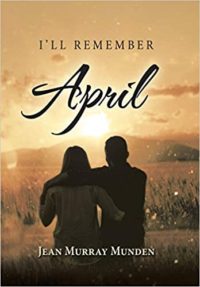Title: I’ll Remember April
Author: Jean Murray Munden
Publisher: Writers Branding
ISBN: 978-1-953048-00-4
Pages: 354
Genre: Fiction
Reviewed by: Jason Lulos
Hollywood Book Reviews
I’ll Remember April by author Jean Murray Munden is a beautifully written, nostalgic story of a woman reflecting upon her life and wondering about “the road not taken.” Eighty-eight-year-old Louise, grateful but wistful, falls into a reverie when recalling the ordinary and extraordinary events of her life which span most of the 20th century. It is a sweeping, romantic tale chronicling four generations, but centers on Louise and her two sisters. The majority of the story takes place during World War I and its aftermath, giving a turbulent historical backdrop mirroring the dramatic changes about to occur in Louise’s romantic life and career.
It is 1985 and Louise’s favorite grandchild, Lulu, comes to visit, asking for romantic advice. Their conversation conjures up many of Louise’s memories of her own early adulthood: becoming a nurse during the first world war and traveling across the continent. The novel is largely composed of Louise’s daydreams and contemplative recollections of the past, but the author has woven them seamlessly with the wisdom she gives to Lulu in their present-day conversations.
The reverie sends Loise back to 1914, at seventeen years old, living in Ottawa with her parents, two sisters, and three brothers. The aura of this period in history is nicely captured by the author. The context of this era is marked by the quaintness of a simpler time but also the foreboding and wonder of a world in transition: the fear of a great war, tuberculosis, influenza, automobiles, and aeroplanes. Although covering Louise’s entire life, the majority of the story is this early period: so much so that it feels as if the novel had been written in the early 1900s. This is one of the great strengths of the novel: the author shifts narration and time periods beautifully, somehow subtle yet also clear.
During a trip to Prince Edward Island in 1914, Louise and Norah befriend a miserable widower and their lives are changed forever. As the sisters find their own paths in life, the narrative’s focus switches amongst the three of them. The author’s illustrative descriptions of the different landscapes (the coast of Prince Edward Island, Vancouver, and the desert southwest of America) give that shifting narration a real sense of change in sister, place, and time.
Vivid characters and detailed relationships, particularly among the three sisters, harken this novel to the likes of Little Women. The historical period and relationships call to mind the “novel of manners” and the Bildungsroman era characteristic of the work of Jane Austen and others. That said, the story will greatly appeal to readers fond of those genres. However, it will appeal to anyone looking for a thoughtfully written, romantic, historically placed story. In Louise’s musings on the past, the “road not taken” element is a persistent hook that draws the reader in further. It involves a “high romantic” twist, one might even say Gothic, nicely bringing together notions of how stories interlock and how the present is informed by the past.

